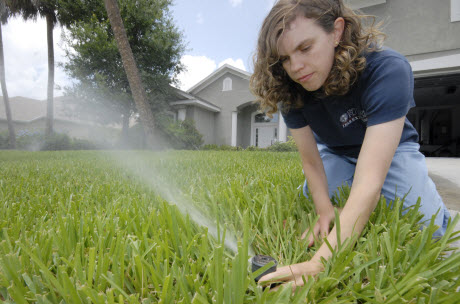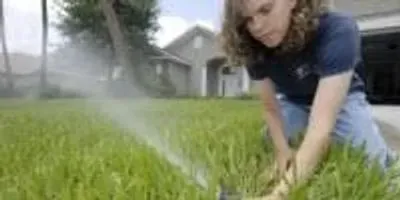 Researchers call them “water considerate” consumers because they conserve water fairly well but could stand some improvement. These water users might be the most appropriate people to target if you want to get more people to conserve water, a new University of Florida Institute of Food and Agricultural Sciences study shows.Photo Credit: UF/IFAS fileGAINESVILLE, Fla. — Researchers call them “water considerate” consumers because they conserve water fairly well but could stand some improvement. These water users might be the most appropriate people to target if you want to get more people to conserve water, a new University of Florida Institute of Food and Agricultural Sciences study shows.
Researchers call them “water considerate” consumers because they conserve water fairly well but could stand some improvement. These water users might be the most appropriate people to target if you want to get more people to conserve water, a new University of Florida Institute of Food and Agricultural Sciences study shows.Photo Credit: UF/IFAS fileGAINESVILLE, Fla. — Researchers call them “water considerate” consumers because they conserve water fairly well but could stand some improvement. These water users might be the most appropriate people to target if you want to get more people to conserve water, a new University of Florida Institute of Food and Agricultural Sciences study shows.
Laura Warner, a UF/IFAS assistant professor of agricultural education and communication and the leader of the newly published study in Environmental Management, worked with a team of UF/IFAS researchers to conduct an online survey of 1,063 Floridians.
“The key takeaway is that there is a group of people who really care about water but have room for improvement in their landscape water conservation practices,” Warner said.
Historically, homeowners irrigate their lawns to make them lush and green, the study says. Yet, many people can reduce the amount of water they use to irrigate without sacrificing a nice lawn, she said. Thus, changing residential landscape water use is important, yet difficult, UF/IFAS researchers said. Those who try to encourage residential irrigators to conserve water often rely strictly on information campaigns. But their results don’t always work very well, Warner said.
Related Article: Recycled Water, Salt-Tolerant Grass a Water-Saving Pair
One reason for that is that many people do not realize how much their landscape practices impact natural resources, or they don’t feel they would personally benefit from conserving water, Warner said. Additionally, “asking people to conserve water can be perceived as a request to sacrifice, even though they may stand to benefit as a result, such as having a reduced water bill,” the study says.
With the online survey, participants answered numerous questions and responded to a plethora of statements. After researchers recorded those answers, they found three groups of water users.
“Water considerate” users made up 45 percent of the respondents in the survey—the biggest group. Others were labeled as “water-savvy conservationists” (36 percent) and “unconcerned water users” (19 percent).
“Water considerate” consumers rate water uses like drinking and recreation fairly highly, Warner said. They show fairly positive attitudes about conserving water, but they have room for improvement in their irrigation.
“They can still do a lot to save water without sacrificing the look of their landscape,” said Warner, who’s also affiliated with the UF/IFAS Center for Landscape Conservation and Ecology.
Water-savvy conservationists already do just about everything they can to save water in the landscape, she said. They also show the most positive attitudes toward water conservation and are most likely to have attended UF/IFAS Extension programs.
So-called “unconcerned water users” lack the strong perceived value for water resources, Warner said. They have lower attitudes toward water conservation and less confidence in their ability to adopt good landscape irrigation practices and technologies. Researchers say their study suggests “water savvy” users can help get more “water considerate” and “unconcerned water users” to be more cognizant about conservation.













